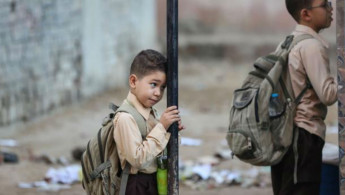Egyptian education minister: Almost half of Egyptians are illiterate
Taha Hussein, the most influential Egyptian writer of the 20th century who became Egypt's education minister in 1950, once famously said: "Education is as water and air."
The fact that over half a century later, 35 out of 80 million Egyptians, more than 40 percent, are functionally illiterate is a measure of Egypt's failure.
This figure was announced recently by the current minister of education, Moheb el-Rafie. However, the UN Educational, Scientific and Cultural Organisation (UNESCO) estimates that up to 60 percent of Egypt's population is in fact functionally illiterate.
Egypt's Central Agency for Public Mobilization and Statistics has revealed that 25.9 percent of people above the age of ten are illiterate, 17.2 million people, but illiteracy among 15 to 24 year olds is 8.6 percent. The Agency also revealed that the highest rates of illiteracy were among people over 60, at 64.9 percent.
| In el-Khalidiya in the governorate of al-Fayyum, south of Cairo, home to 600,000 residents has an illiteracy rate of 90 percent. |
Residents of rural areas also have higher rates of illiteracy than residents of urban areas, with 31.2 percent compared to 19.1 percent. Rural areas to the south of Cairo, including all of Upper Egypt, have the highest rates of illiteracy in the country.
In el-Khalidiya in the governorate of al-Fayyum, south of Cairo, home to 600,000 residents has an illiteracy rate of 90 percent due to the lack of primary schools in the area. Residents who can afford transport send their children to school in nearby areas, while those who cannot send their children to learn trades or farming.
Islam Mohammad, a 13-year old boy living in el-Khalidiya, said: "I wish I could go to school, but there aren't any schools in the area. I used to walk six kilometres to the school in the neighbouring village... not to mention the expenses. These things forced me to leave school."
Mohammad now works with his elder brother to provide for his elderly parents and sisters. He said he would have gone back to school if he did not have to worry about making a living for himself and his family.
Mustafa Rajab, the former director of the Organisation for Literacy and Adult Education said: "In the past, a university graduate would teach a hundred illiterate people in his village, however this system soon collapsed. Today, we expect illiteracy rates to increase further because of the lack of a school in 2,343 small villages."
Rajab said that combatting illiteracy required the building of new schools, as a child is born in Egypt every ten seconds, adding that government buildings should be used to teach adults and school dropouts.
Hassan Shahata, an educational specialist said he believed the spread of illiteracy in Egypt was due to years of neglect of education. Each classroom contained over 120 children, he said, especially at primary level. He added that the difficult economic situation, especially in rural areas, had forced many students to drop out and look for work.
"In the modern world, illiteracy means not knowing to use computers, but for us it is still about reading and writing," said Shahata. He added: "the spread of ignorance and illiteracy will cause Egypt to regress and its economy to collapse, because an illiterate person cannot contribute truly productive work."
Opinions expressed in this article remain those of the author and do not necessarily reflect the opinions of al-Araby al-Jadeed, its editorial board or staff.
This is an edited translation from our Arabic website.



